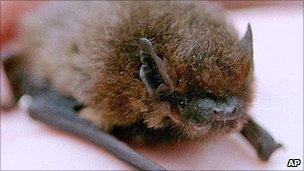Peak season for bat rescues, warn conservationists
- Published

More than 150 bats are rescued each year by Cornwall's Bat Hospital
Conservationists in Cornwall are warning it is the peak season for bat rescues.
Bats give birth to their young in early June but within just a week juvenile bats are at risk of injury.
Newborn babies spend a week clinging to their mother and feeding, after which they are full of milk and fall off.
Sue Harlow, from The Cornwall Bat Hospital, said they deal with around 150 bat casualties each year.
Ms Harlow said: "People often find bats on the floor but cannot reach their roost to return them, so they have to bring the baby into care.
"We look after them and hopefully release them when they can fly."
'Casualty advice'
She added that if people know what to do when they find a casualty, admissions levels can be kept low.
The Bat Hospital's advice is if you find a bat on the ground, don't pick it up with your bare hands, use gloves or a cloth to scoop the bat up, put it into a shoebox with some holes in and a plastic milk bottle top full of water in the corner.
Diana Chambers, from St Columb, has learned to live with bats in her house.
Ms Cambers said: "There is an Aga directly below this floor so I think they get the indirect heat from that and they get the hot water heat along the pipes from the bath outlet.
"You can't do anything about bats, if you've got them, you've got to keep them, so you might as well get on with it and enjoy them."